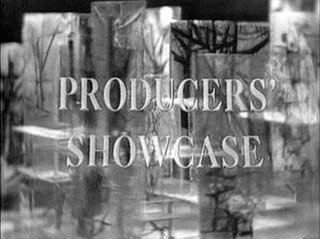
The American Broadcasting Company (ABC) is an American commercial broadcast television and radio network that serves as the flagship property of the Disney Entertainment division of the Walt Disney Company. ABC is headquartered on Riverside Drive in Burbank, California, directly across the street from Walt Disney Studios and adjacent to the Team Disney – Roy E. Disney Animation Building. The network maintains secondary offices at 77 West 66th Street on the Upper West Side of Manhattan, New York City, which houses its broadcast center and the headquarters of its news division, ABC News.

Color television or colour television is a television transmission technology that includes color information for the picture, so the video image can be displayed in color on the television set. It improves on the monochrome or black-and-white television technology, which displays the image in shades of gray (grayscale). Television broadcasting stations and networks in most parts of the world upgraded from black-and-white to color transmission between the 1960s and the 1980s. The invention of color television standards was an important part of the history and technology of television.
The year 1953 in television involved some significant events. Below is a list of television-related events during 1953.

American Bandstand (AB) was an American music-performance and dance television program that aired regularly in various versions from 1952 to 1989. It was hosted from 1956 until its final season by Dick Clark, who also served as the program's producer. It featured teenagers dancing to Top 40 music tracks introduced by Clark. The program was televised from Philadelphia from its 1952 debut until its move to Los Angeles in 1963.

Richard Wagstaff Clark was an American television and radio personality and television producer who hosted American Bandstand from 1956 to 1989. He also hosted five incarnations of the Pyramid game show from 1973 to 1988 and Dick Clark's New Year's Rockin' Eve, which broadcast New Year's Eve celebrations in New York City's Times Square.

The ABC Sunday Night Movie is a television program that aired on Sunday nights, first for a brief time in 1962 under the title Hollywood Special to supposedly replace an open time slot for the TV show Bus Stop, which was cancelled after March 1962. It then began airing regularly under its more commonly known title from late 1964 to 1998, on ABC. Since 2004, it has aired sporadically as a special program, now titled the ABC Sunday Movie of the Week, though as of the 2011-12 television season, the only films in this timeslot were aired under the Hallmark Hall of Fame banner, which transferred to ABC in that season. However, in 2014, The Hallmark Hall of Fame moved exclusively to cable on the Hallmark Channel. As a result of this, the Sunday Night Movie is now exclusively relegated to two special holiday movies, The Sound of Music every holiday season and The Ten Commandments every Easter.
The Major League Baseball Game of the Week (GOTW) is the de facto title for nationally televised coverage of regular season Major League Baseball games. The Game of the Week has traditionally aired on Saturday afternoons. When the national networks began televising national games of the week, it opened the door for a national audience to see particular clubs. While most teams were broadcast, emphasis was always on the league leaders and the major market franchises that could draw the largest audience.
Famous Film Festival was American television's first prime-time movie series. It aired Sunday nights 7:30-9:00 pm (EST) on ABC during the 1955-56 television season, switching to Saturday nights during its second and final season, 1956-57.

Ford Theatre, spelled Ford Theater for the original radio version and known, in full, as The Ford Television Theatre for the TV version, is a radio and television anthology series broadcast in the United States in the 1940s and 1950s. At various times the television series appeared on all three major television networks, while the radio version was broadcast on two separate networks and on two separate coasts. Ford Theatre was named for its sponsor, the Ford Motor Company, which had an earlier success with its concert music series, The Ford Sunday Evening Hour (1934–42).

Producers' Showcase is an American anthology television series that was telecast live during the 1950s in compatible color by NBC. With top talent, the 90-minute episodes, covering a wide variety of genres, aired under the title every fourth Monday at 8 pm ET for three seasons, beginning October 18, 1954. The final episode, the last of 37, was broadcast May 27, 1957.

Lost television broadcasts are television programs that were not preserved after they were broadcast, rendering them permanently unavailable for both public and private viewing. Studio archives and other historical records do not contain these programs. This phenomenon primarily affects shows or movies that aired before the widespread use of home video recording and digital archiving.
NBC Saturday Night at the Movies was the first television show to broadcast in color relatively recent feature films from major studios. The series premiered on September 23, 1961, and ran until October 1978, spawning many imitators. Television stations had previously only been able to show older, low-budget, black-and-white films. In the late 1970s, competition from cable television and home video led to a decline in viewership.
In 1950 the Mutual Broadcasting System acquired the television and radio broadcast rights to the World Series and All-Star Game for the next six years. Mutual may have been reindulging in dreams of becoming a television network or simply taking advantage of a long-standing business relationship; in either case, the broadcast rights were sold to NBC in time for the following season's games at an enormous profit.
In 1960, ABC returned to baseball broadcasting with a series of late-afternoon Saturday games. Jack Buck and Carl Erskine were the lead announcing crew for this series, which lasted one season. ABC typically did three games a week. Two of the games were always from the Eastern or Central Time Zone. The late games were usually San Francisco Giants or Los Angeles Dodgers' home games. However, the Milwaukee Braves used to start many of their Saturday home games late in the afternoon. So if the Giants and Dodgers were both the road at the same time, ABC still would be able to show a late game.
By 1969, Major League Baseball had grown to 24 teams and the net local TV revenues had leaped to $20.7 million. This is in sharp contrast to 1950 when local television brought the then 16 Major League clubs a total net income of $2.3 million. Changes baseball underwent during this time, such as expansion franchises and increasing the schedule from 154 games to 162, led to a wider audience for network and local television.
From 1965 through 1975, in addition to the Saturday night game on CBC, Hockey Night in Canada also produced and broadcast a Wednesday night game on CTV, CBC's privately owned competitor; beginning in the 1975–76 NHL season, these midweek games would begin to be broadcast by local stations.

Sunday Afternoon Baseball is the de facto branding used for nationally televised live game telecasts of Major League Baseball games on Sunday afternoons during the regular season.
Sports programming on ABC is provided on occasion, primarily on weekend afternoons; since 2006, the ABC Sports division has been defunct, with all sports telecasts on ABC being produced in association with sister cable network ESPN under the branding ESPN on ABC. While ABC has, in the past, aired notable sporting events such as the NFL's Monday Night Football, and various college football bowl games, general industry trends and changes in rights have prompted reductions in sports broadcasts on broadcast television.









